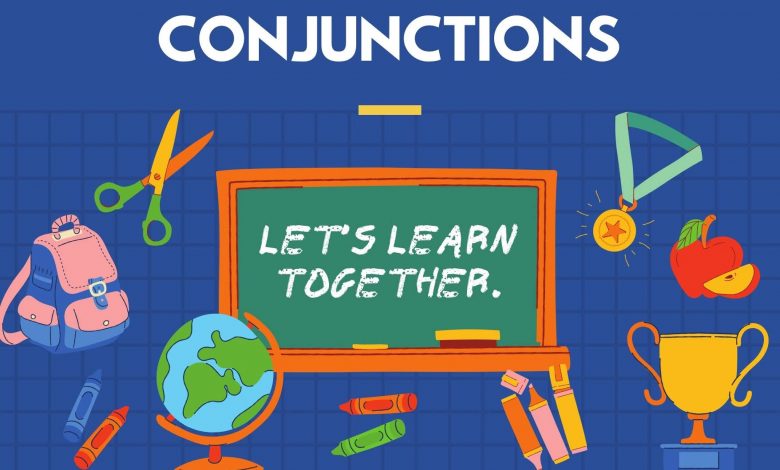Do you want to make long sentences? But you probably have no idea how to do it.

Conjunctions
A Conjunction is a word that is used to connect two or more than two Nouns, Pronouns, Verbs, sentences, phrases, and clauses. The below sentences are coordinating conjunction examples.
Example:- a) Rahul is a doctor. B) Rakesh is a doctor.
Use of conjunction:- Rahul and Rakesh are doctors.
- He knows me. * I don’t know him.
Use of conjunction:- He knows me but I don’t know him.
Types of conjunctions
There are mainly two types of conjunctions here which are most commonly used in the English language.
- Coordinating conjunctions
- Sub-ordinating conjunctions
Additional conjunctions
- Co-relative conjunctions
- Compound conjunctions
Types of Co-ordinating Conjunctions
- Cumulative
- Alternative
- Adversative
- Illative
Cumulative Conjunctions
This is a conjunction example list with elaborative sentences so that you can easily learn them and use them efficiently. The cumulative conjunctions are used for equality in words and sentences. It describes one thing with another one. The bold word in the sentences represents conjunction in a sentence.
And, Both…and, As well as, Not only…but also, too, also, no less than Etc.
And
- Vinod and Monu are lovely brothers.
- Sonu goes to school and tuition.
- I wake in the early morning to go for a walk and meet my friends at the park.
- He is smart and intelligent.
Both…and
This conjunction is used to describe two things of a mutual one.
- Ravi is both a mathematics and science teacher.
- He both studies and does a part-time job.
- Both Neha and Sonu stay together happily.
As well as
- Vinod is my mentor as well as my brother.
- I am a writer as well as a dancer.
- Sometimes she is happy as well as sad.
Not only…but also
- He not only helps me but also suggests me new amazing ideas for my work.
- Not only my parents but also my best friend always is so supportive
- I not only learned English but also started teaching it.
- In this conjunction use everything according to the second subject as in the second sentence.
Too
- She is smart and loyal too.
- Omkar prepares for competitive exams and teaches too.
Also
- They come on time in class and also complete H.W.
- She cooks food deliciously and writes content also.
No less than
- I no less than my best friend is punctual.
- They love ice cream no less than chocolates.
Alternative Conjunctions
With the help of using this conjunction, we connect two or more optional things together by using the below words.
Or, Else, Otherwise, Either… or, Neither…nor
OR
- I can read books or write something interesting.
- You can attempt this exam in Hindi or
- Your colleague or you will submit this report by the next morning.
Else
- Complete this project else you will not receive any payment.
- She will have to answer me for it else I won’t allow her for anything.
- I went to the doctor timely else he wouldn’t save my life.
Otherwise
- I ran faster otherwise I would have missed my bus today.
- Help the needy otherwise the god will not help you.
- Sonu occasionally meets his school friends otherwise they will forget him.
Either…or
- Neha would like to have either ice cream or chocolate.
- Either Roma or I am telling a lie.
- I can pass my time with either my phone or
Neither…nor
- She neither married him nor left him.
- I like neither indiscipline nor
- Neither My friends nor I drink apart from special occasions.
Adversative Conjunctions
This conjunction is used to connect opposite things together.
Yet, But, while, whereas, Still, Only, nevertheless, however
Yet
- She mostly turns up late in the class yet the teacher never scolds or punishes her.
- My friend is an alcoholic yet has a beautiful girlfriend.
- Although he has been learning English for more than 2 years yet he is unable to write or speak it perfectly.
But
- We went to school every day but didn’t study at all.
- I like her a lot but she doesn’t even talk to me.
- I am his best friend but I don’t have one.
While
- I am always to talk to you while you are busy with someone else.
- You are sitting at home while I work here in the fields.
- Many persons from your family have sacrificed their dreams just to fulfill yours while you are wasting time with your phone.
Still
- It has been more than 10 years and I am still waiting for your presence in my life.
- She is still my friend.
- I still believe that I can do all that I think.
Only
- Presently we are suffering from coronavirus only God can save us with a miracle.
- Only my father can guide me to run my home with his experience.
- I know only cooking and this will help me get a job.
Nevertheless
- She is very rude nevertheless she talks to her teacher very politely.
- I didn’t have any idea how to start a business or money to invest nevertheless I started it anyhow.
- The government has enforced lockdown in the country nevertheless some people go out unnecessarily.
However
- There is no transport on the road these days however I somehow go to the office.
- However studious you may be, you can’t stand first in the class.
- You may get rejected ample times however your preparation to win should never be stopped.
Illative Conjunctions
So, For, Therefore, Then, Hence
Illative conjunctions are used to show the results and consequences of an antecedent sentence.
- I was late for my class, so I went there driving fast.
- My father’s dream was to see me as an IAS office for I worked hard and completed his dream.
- We had a surprised birthday plan for Raju then we went to wish him at 12 am sharp.
- I don’t like going to parties hence I ignore it and stay at home.
Soon you will have an optional conjunction exercise with answers which will help you examine yourself with the latest model of test which will be used in the future for the evaluations. In the upcoming blog, you will have a detailed explanation of the subordinating conjunctions in time.
For more information Visit Us: https://www.weengwing.gq/





